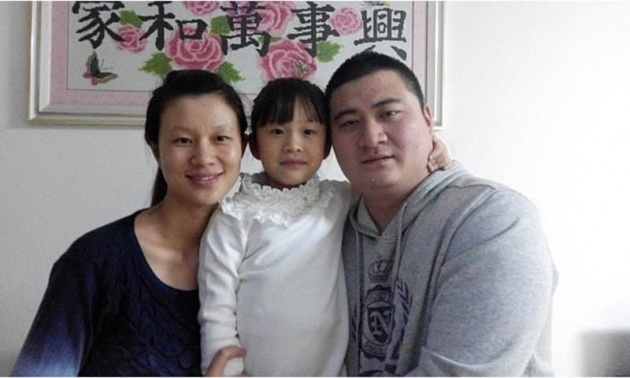|
Liu Guochao and his wife Wang Juan are looking forward to the birth of their second child in March. They decided on having a second child in the hopes of having a boy to carry on the family line. They also want their daughter Zihan to learn social skills through having a sibling.
|
Stories of elderly couples whose only child died due to illness or accidents have worried Zheng Shuang-yan, 35, and her husband Zhang Zuoyou, 36.
They are also concerned that their 10-year-old daughter Tianning - their only child - would have to take care of them and her grandparents on her own with no siblings to share the burden.
That was why the Beijing couple jumped at the chance to have a second child soon after China, in late 2013, relaxed its one-child policy that had restricted millions of couples to one child since 1979.
The policy change allows couples where one is a single child - known as dan du fu fu in Mandarin - to have two children. Previously, only couples who are both single child, or shuang du fu fu, could do so.
"I never thought I could become a mother again as I didn't think the policy would ever be relaxed," Zheng, who gave birth to a boy on January 16, told The Sunday Times. "Words can't describe my emotions when I first held the baby in my arms," added the magazine editor, whose husband is a researcher.
In the past year, many Chinese couples like the Zhangs have experienced the thrills of reliving parenthood a second time, the joy of having a playmate for the firstborn, or the relief at having a son to carry on the family line.
However, overall, the response to the policy change has been tepid. While some, including the Zhangs, have quickly availed themselves of it, many have not done so for various reasons, including inadequate childcare, high costs of bringing up another child, age - and even objections from the only child.
Official statistics released on January 12 showed that nearly one million couples have applied to have a second child since January last year as local governments began to implement the policy change announced by president Xi Jinping in November 2013.
Some 920,000 applications were approved, though experts estimate that of these applicants, those who actually went on to have a second child number between 600,000 and 700,000.
One such couple are Liu Guochao, 28, and his wife Wang Juan, 31, who are awaiting the arrival of their second child in March.
The Beijing couple, who have a five-year-old girl Zihan, admit that they are having a second child chiefly because of their desire for a boy to carry on the family line.
They are doing this also because they want their daughter to learn social skills through having a sibling.
"We also felt it is good for our girl to have a companion as she was showing signs of being unsocial," said Liu, who works in property management and whose wife works in sales.
These were the same sentiments that drove He Haitao, 38, and his wife Liu Na, 34, to try for a sibling for their son Pengyu, now six.
"A single child tends to have more character flaws than those with siblings, such as not being a team player," said He, who works in a property firm.
Such traits, along with being spoilt and inward-looking, are often ascribed to children of one-child families and led to the children being referred to as "little emperors and empresses".
Some are even loath to sharing the parents' love with a younger sibling. Chinese media reported last week that a 13-year-old girl in central Henan province recently attempted suicide and forced her mother, who was 13 weeks pregnant, to abort the baby.
As for He and his wife, they became parents again last November when their daughter Xinran was born. It was possible only because their parents have agreed to help care for the grandchildren, said He.
"Without help from the grandparents, I don't think it is possible to have a second child as both of us have to work. Thankfully, the grandparents believe that it is good to have more children in the family," he added.
He said he and his wife had been keeping themselves in good health through regular exercise in the hope of becoming parents quickly once the policy was relaxed.
He was thus relieved that the policy change came in time, as he would have serious reservations about his wife becoming a mother again if she were aged above 35.
But for others, the change has come too late.
Sun Yuejiu, 36, a lecturer at Changchun University of Technology in north-western Jilin province, had to give up her desire for a second child due to age issues.
She worries over the age gap between her 10-year-old daughter and a second child and also the ability of her elderly in-laws and her mother to help care for two children.
"My daughter is becoming a teenager soon, when her emotional needs will rise. I fear that a second child might affect my ability to meet those needs," said Sun, who is an only child herself.
She is also worried that becoming a mother again would hurt her career prospects, said Sun, revealing that it took many family meetings for the couple to arrive at the tough decision not to have another child.
Sun had long wanted a second child, after 14 years of caring for her late father who suffered from a muscular disease made her see the downsides of being an only child.
Apart from age issues, another strong deterrent to couples having a second child is the costs of having one.
Research assistant Guan Li, 31, has ruled out the possibility of having another child because she believes the 120,000 yuan (US$19,249) combined annual income of her lecturer-husband and hers is too little to raise two children on.
"I know the benefits of having two kids but our financial state doesn't allow us to do so," said Guan, who has a two-year-old boy.
So it is that the response to the policy change has been poorer than expected.
Officials had expected two million second-child applications in the past year, which would be an 18 per cent response rate based on the estimated 11 million dan du couples in China.
The strongest response came from southern Guangdong province, which has a 27 per cent application rate among eligible couples, four times that in Beijing and Shanghai.
The poor response has reignited calls from experts for China to scrap the one-child policy which has been blamed for China's ageing society and shrinking working-age population.
But obstacles remain, as local governments rely heavily on fines collected from illegal births. Abolition of the policy would also affect the livelihoods of some seven million people employed in China's family-planning regime.
Sun believes these factors explain why the local authorities have been hush-hush about the policy change, leaving many couples unsure about whether they would be penalised for having a second child.
"I believe the government should just scrap the policy, or the future generations will have to suffer," she said.
To other dan du couples still weighing their options, Zheng advised them to adopt a long-term view, adding that having a second child would help lower the pressure on their only child.



